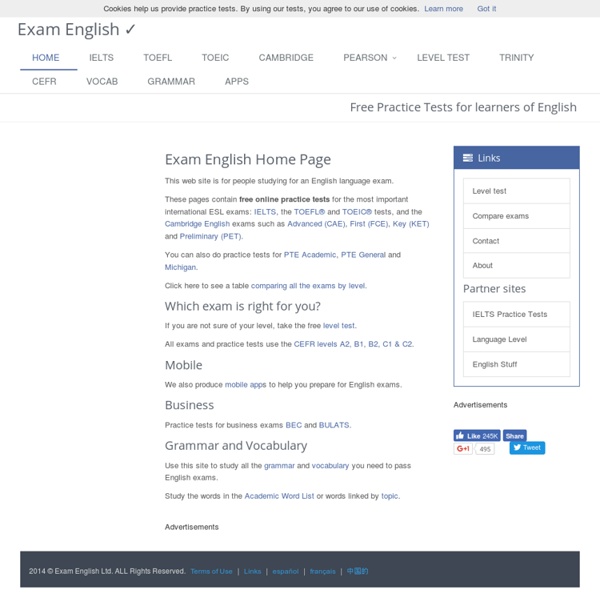



Useful FCE websites | Sandy Millin Here are all of the useful websites I can find to help students preparing for the Cambridge First Certificate exam. Please let me know if there are any broken links, or if you find something you think I should add. General www.flo-joe.com/fce/ Great website, full of tips, especially for Reading, Use of English and Writing. The official Cambridge FCE website, with information about the length of the papers and the task types, as well as some free materials to download. Three sites aimed at students. Alex Case’s excellent collection of FCE worksheets. FCE Result (affiliate link – I will earn money from Amazon if you buy anything after clicking this link), the OUP coursebook, has online exercises for each unit of the book. Practice exams A free practice test, not including speaking Vocabulary Grammar
Coherence: Transitions between Ideas The most convincing ideas in the world, expressed in the most beautiful sentences, will move no one unless those ideas are properly connected. Unless readers can move easily from one thought to another, they will surely find something else to read or turn on the television. Providing transitions between ideas is largely a matter of attitude. You must never assume that your readers know what you know. In fact, it's a good idea to assume not only that your readers need all the information that you have and need to know how you arrived at the point you're at, but also that they are not quite as quick as you are. There are four basic mechanical considerations in providing transitions between ideas: using transitional expressions, repeating key words and phrases, using pronoun reference, and using parallel form. The use of the little conjunctions — especially and and but — comes naturally for most writers. Repetition of Key Words and Phrases Pronoun Reference Parallelism
App Exam Lift Exam Lift Exam Lift es una nueva aplicación móvil que te ayuda a prepararte para tu examen A2 Key for Schools y B1 Preliminary for Schools. Proporciona una variedad de actividades basadas en actividades y tareas de examen que te ayudarán a mejorar tu expresión escrita y oral, comprensión de lectura y auditiva (reading, writing, listening, speaking). La aplicación ha sido diseñada para complementar el aprendizaje y la preparación del examen que haces en clase. Es una forma flexible de desarrollar tus destrezas en inglés, en casa o incluso de camino al colegio o la academia. ¿Cuáles son las ventajas? Exam Lift: A2 Key for Schools Descargar gratis ahora en Android yiOS. Exam Lift: B1 Preliminary for Schools Descargar gratis ahora en Android y iOS. Política de privacidad de Exam Lift y acuerdo de licencia del usuario
5 examples of how the languages we speak can affect the way we think Keith Chen (TED Talk: Could your language affect your ability to save money?) might be an economist, but he wants to talk about language. For instance, he points out, in Chinese, saying “this is my uncle” is not as straightforward as you might think. “All of this information is obligatory. This got Chen wondering: Is there a connection between language and how we think and behave? While “futured languages,” like English, distinguish between the past, present and future, “futureless languages” like Chinese use the same phrasing to describe the events of yesterday, today and tomorrow. But that’s only the beginning. Navigation and Pormpuraawans In Pormpuraaw, an Australian Aboriginal community, you wouldn’t refer to an object as on your “left” or “right,” but rather as “northeast” or “southwest,” writes Stanford psychology professor Lera Boroditsky (an expert in linguistic-cultural connections) in the Wall Street Journal. Featured illustration via iStock.
Tips to help you get your students ready for exam day | Cambridge English Exam time is approaching and your students are almost ready to take their exam. After preparing and practising, it’s time to ensure they feel ready and confident for exam day. But as all experienced teachers know, they also need to understand the exam format. Students, for example, need to know what’s expected of them at each stage of the exam. They should have a clear idea of how long they can spend on each question, and they should have a good understanding of how the exams are structured. In this post we’re sharing five top tips and resources that you can use with your learners in the lead-up to the exam. 1. Learners may have lots of questions ahead of the exam. Here are some of our exam day tips for older students: Students may bring a clear plastic bottle of water with them into the exam. A free booklet is available to download for each level: 2. Remember to check in on your students regularly. Ask students to evaluate themselves and hand it back to you afterwards. 3. 4. 5.
TeacherTube - Teach the World untitled